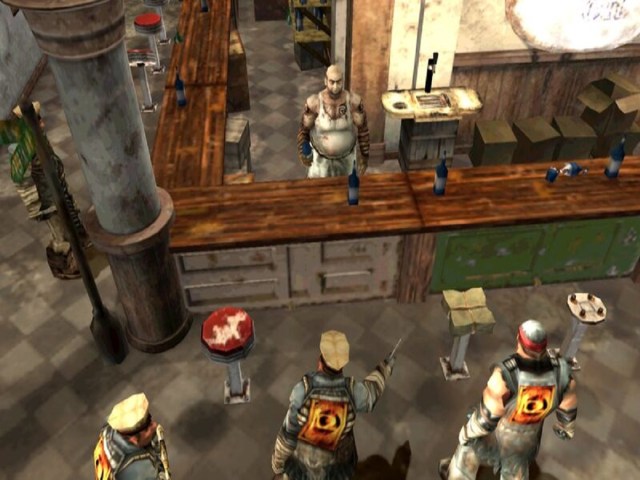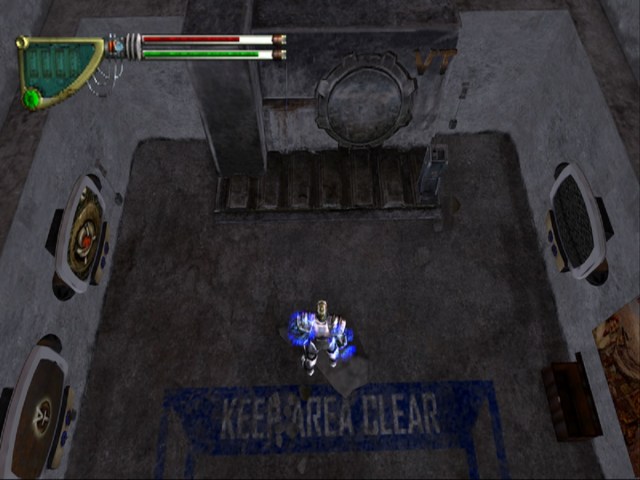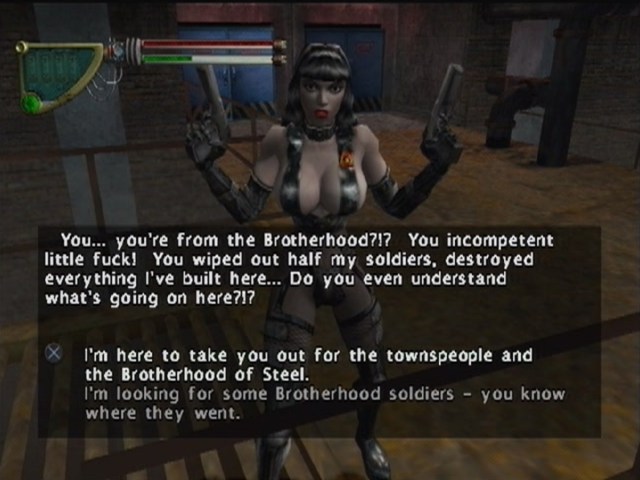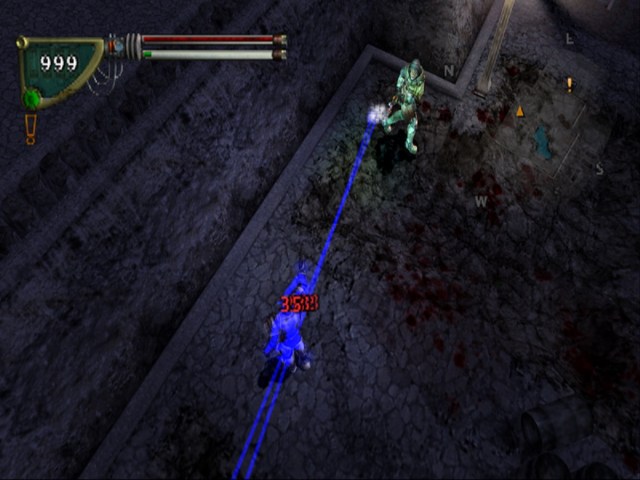Born without a butthole
I really thought this was going to be worse. Hearing about 2004’s Fallout: Brotherhood of Steel in the years since Fallout 3 introduced console players to the franchise, I thought it was going to be an abomination. If Fallout Tactics: Brotherhood of Steel (don’t get them confused) is the series’ black sheep, then surely Fallout: Brotherhood of Steel was the sibling that died early because it was born without a butthole.
I was led to believe it was a barely related cash-in made by people who paid no care to the license it was based on. It has advertising for Bawls in it; that caffeinated energy drink with the cheeky name. Bawls. There was no way it could possibly be good.
It’s not, but it definitely has a butthole.

Lowered Expectations
I guess there’s a lot to be said about lowered expectations.
To be fair, Fallout: Brotherhood of Steel was being developed around the same time as the planned Fallout 3 was at Black Isle Studio. Black Isle was having its own issues. A lot of the team responsible for the original Fallout left because of a disagreement with Interplay. In 2001, Interplay was bought up by Titus, which is a name I can’t say without my body trying to reject my vocal cords. The remaining team at Black Isle continued working on Fallout 3, only to have it cancelled and the studio shuttered in 2003.
Fallout: Brotherhood of Steel continued development in-house at Interplay. It’s not the development team’s fault that Black Isle got the shaft, as they so often did, but you can see why fans weren’t exactly receptive to its existence. It probably would have been more welcomed if it was a console title that was arriving alongside another whole-fat title in the series, but that wasn’t the case anymore.
Conceived as a console-focused spin-off of Fallout, Fallout: Brotherhood of Steel builds on the same engine as Balder’s Gate: Dark Alliance. Rather than a full RPG like the main series, it’s more of a dungeon crawler not too far removed from Diablo. There are still a number of RPG systems running beneath the action, but it’s a much more linear experience. You won’t be getting a car, driving out to Reno, and becoming a porn star.
And that’s a bit of a shame.

Nuclear F-bomb
That said, when taken as a spin-off, Fallout: Brotherhood of Steel is… fine. It’s amusing to look back at the reviews that came out about it at the time, since they’re very quaint by today’s standards. The complaint I saw repeated frequently was the game’s use of “four-letter words,” and crude humor. Fuck, I’m glad we’re past the days when dropping an f-bomb was considered shocking and obnoxious. This was 2004, just shy of the 2006 release of Scarface: The World is Yours, which set a new standard for fuck’s sake.
It’s honestly not that bad. It wasn’t so intrusive that I even really noticed that Fallout: Brotherhood of Steel had an affection for the word until I checked the opinions of others. The humor is a little, er, ‘aughties. I don’t personally see how it’s so intrusive, but it has aged poorly. But, I mean, in Fallout 2, you could lose an arm wrestle with a super mutant, then wake up with a ball gag in your inventory. The implications aren’t so subtle. I’m just saying, the bar wasn’t set particularly high when it comes to the sophistication of the humor.
A lot of other complaints were more on the mark. The combat, for example, is boring. This isn’t really too out of the ordinary for dungeon crawlers, I just don’t particularly dig it. You have a lock-on system, but you can only move while firing if you’re playing as one of the female characters. There’s a dodge button, but since this isn’t Dark Alliance and enemies are using firearms, it’s not all that useful. You can really just turn your brain off for much of the fighting, which will probably be a positive from some perspectives, but I don’t love it.

A varied wasteland
The level design holds up a bit better. I generally have a distaste for dungeon design, regardless of whether it’s Zelda or Fallout. However, through the game’s three chapters, there’s a lot of variation in location. Even when you get to areas where you’d expect things to become samey, there manages to be distinct visual differences.
There’s maybe a bit too much love for instant death here. Fortunately. save points are extremely frequent, and you can always find one at the beginning of each section.
But while there’s a lot of variety in the locations of Fallout: Brotherhood of Steel, there isn’t so much when it comes to equipment. New weapons and armor are very gradually drip-fed, and a lot of them are largely interchangeable. Ammunition is really the bigger concern, as firearms tend to eat up a lot of it in an effort to deal damage. For much of the game, I simply went with melee weapons, which themselves are very interchangeable. It just meant that I didn’t have to deal with ammunition, and it made the combat feel slightly less mindless.

War never changes
Altogether, you’re looking at 10-12 hours to get through Fallout: Brotherhood of Steel. There is some replay value, as playing through it will unlock additional characters. Still, it feels like too much game for what it is. While the levels get more interesting as you progress, the gameplay feels too monotonous and worn thin by that point.
I’m sure this isn’t going to surprise you, but it also doesn’t adhere very strictly to continuity. The developers were obviously familiar with the world of Fallout, so it’s not as though this spin-off is completely unrelated, but they seem to have been more focused on making a title for console gamers rather than make their mark on the series. Considering Fallout 3 didn’t do the best job of sticking to the established narrative, it’s maybe more forgivable today.
I’m mostly bringing this up as a warning. I don’t have much reverence for the continuity of the series, but some people do, so there it is.

Fox on the box
I’m going to be honest; I kind of enjoyed the experience. This may be to do with the fact that my expectations were dredging the ocean floor. I was kind of expecting Fallout: Brotherhood of Steel to be painful to play, and it’s definitely not that bad.
However, it’s easy to see where the rather loud complaints came from. Interplay was a pretty horrible parent to the Fallout series to begin with, and that only seemed to get worse when Titus took over. Maybe the game itself isn’t that bad, but the company politics going on around that time certainly were.
The developers definitely didn’t just phone it in. While Fallout: Brotherhood of Steel isn’t a great game, it’s not just a quick write-off. You can tell the team behind it at least cared to some extent about the quality of the final product. I guess what I’m saying is; we can all blame Interplay and, by extension, Titus for why Fallout: Brotherhood of Steel receives so little love. We all rely on reputation, to some extent, to decide on what games we play, so it’s a bit of a bummer when the real reason for a game’s derision has to do with the company behind it and not the game itself.
On the other hand, I now want to try the Baldur’s Gate: Dark Alliance games. The older ones, I mean. If Fallout: Brotherhood of Steel was Dark Alliance, but not very good, then Dark Alliance must at least be better than not very good.







